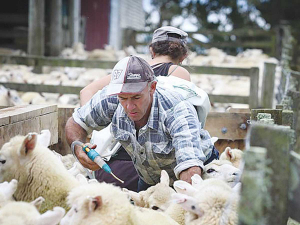NZ scientists make breakthrough in Facial Eczema research
A significant breakthrough in understanding facial eczema (FE) in livestock brings New Zealand closer to reducing the disease’s devastating impact on farmers, animals, and rural communities.
 AgResearch scientist Dave Leathwick says there is a degree of conjecture and uncertainty about the benefits of pre-lambing drenching.
AgResearch scientist Dave Leathwick says there is a degree of conjecture and uncertainty about the benefits of pre-lambing drenching.
AgResearch scientist Dr Dave Leathwick believes there’s a strong case for thinking twice about the practice that is routinely carried out by around 80% of sheep farmers as part of their pre-lamb animal health treatments.
Speaking on a recent webinar, Leathwick says pre-lambing drenching is ingrained in farmers’ psyche, despite there being a degree of conjecture and uncertainty about the benefits of the practice.
He says trials first carried out in the 1960s and 1970s showed inconsistent benefits from drenching ewes, either pre- or post-lambing, and subsequent trials have reinforced these findings.
The practice also increases the risk of selecting for drench resistant parasites, particularly when long-acting products are used.
Seven years ago, AgResearch helped two groups of farmers carry out 14 anthelmintic trials on eight farms in the Wairarapa over two years. The trials were looking at several variables, including the financial benefits of a pre-lamb treatment with a long-acting drench and what treatments were the most effective.
A cost-benefit analysis of the treatments was carried out and showed 47% of the treatments to ewes resulted in a net financial loss, some as much as $10/ewe.
This was because some of the treated ewes in the trials weaned fewer lambs than the un-drenched cohort.
A follow-up study looking specifically at whether there was a survival advantage or disadvantage to drenching ewes pre-lamb was carried out across New Zealand. While, as before, there was a wide variation between treated and untreated ewes and between farms, on average there was no advantage or disadvantage to lamb survivability.
But the question remained about whether a drench treatment could result in lamb deaths persisted. As part of the investigation into this question, Leathwick’s group have shown that Macrocyclic Lactone (ML) drenches are passed to the young lamb in the ewe’s milk and that Moxidectin can be transferred across the placenta and enter the foetus.
“We don’t know yet whether these findings are important or not, but it seem to be an issue worthy of further study.”
One of the more surprising findings of the Wairarapa trials was the lack of correlation between Body Condition Score and anthelmintic treatment or Faecal Egg Counts.
Body Condition Score was largely irrelevant in terms of the scale of the response to treatment.
Scientists found that over the period from pre-lambing to weaning, a proportion of the ewes increased in body condition, a proportion lost body condition, and some stayed the same irrespective of drench treatments.
Leathwick says there was no evidence to show that skinny ewes were affected by parasites any more than fat ewes. And they could not show that there was any greater benefit to pre-lamb drenching ewes in low body condition.
“However, there may be other benefits, such as ewe survival over winter that we did not measure” he cautioned.
In another, more recent trial, AgResearch found a short-lived liveweight response to drench capsules and injectables in low body condition score ewes. However, most of this advantage did not persist through until weaning. He cites several previous New Zealand studies which have shown the same thing. The benefit measured at the time these long-acting drenches cease working is reduced with time afterwards as the untreated ewes tend to catch-up.
Work is on-going, but Leathwick urges farmers to reconsider what they are getting from their pre-lamb drench programme.
The Meat Industry Association of New Zealand (MIA) today announced that Chief Executive Officer Sirma Karapeeva has resigned from the role.
The winners of the 2026 Hawke’s Bay/Wairarapa Dairy Industry Awards were announced at the annual awards dinner held at Copthorne Solway Park in Masterton on Thursday evening.
Environment Southland is welcoming this week’s decision by the Environmental Protection Authority (EPA) to approve the release of Blaptea elguetai, a leaf‑feeding beetle that will help control the highly invasive Chilean flame creeper.
This March, the potato industry is proudly celebrating International Women’s Day on 8 March alongside the International Year of the Woman Farmer, recognising the vital role women play across every part of the sector — from paddocks and packhouses to research, leadership, and innovation.
Fruit trader Seeka posted a record profit and returns to shareholders in 2025.
Recent weather events in the Bay of Plenty, Gisborne/Tairawhiti, and Canterbury have been declared a medium-scale adverse event.

OPINION: A mate of yours truly reckons rural Manawatu families are the latest to suffer under what he calls the…
OPINION: If old Winston Peters thinks building trade relations with new nations, such as India, isn't a necessary investment in…